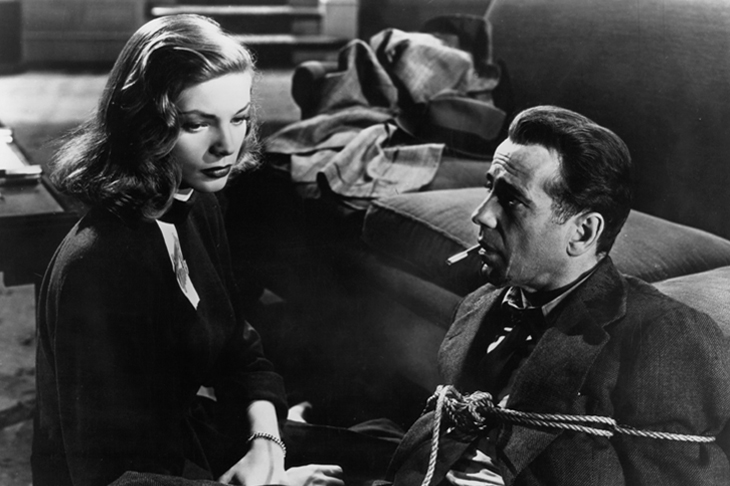There aren’t many downsides to being a film critic, but one of them is being asked to name your favourite movie. You bluster and bluff, and then cop out by saying the answer changes from year to year and sometimes from day to day.
Then you read David Thomson’s new book and realise that from now on you’re going to say that while you’ll probably never have a definitive favourite film, you do have a favourite film factory. Any movie that starts with kettledrums and a blare of brass, and a black and white escutcheon (in later years, gold and blue) emblazoned with the initials WB is likely to be a cut above: intelligent, liberal and seriously amusing. As Thomson says at the end of this brief, bracing, not-quite biography, Warner Brothers is ‘the best studio there ever was’.
It was the brainchild of a family of Ashkenazi Jews. Moses, Aaron and Szmul Wonskolasor were young children when their shoemaker father, Benjamin, brought them and their mother, Pearl, to America from Poland in the late 1880s. (The boys were renamed Harry, Albert and Sam Warner in the process.) Then, in 1892, with the family now living in Ontario, another son — Itzhak, or Jack — came along.
Largely because we know least about him, Sam seems like the most approachable of the bunch. He died young, in 1927, the day before the mid-shoot magic he had worked to transform The Jazz Singer from a silent to a talkie took America by storm. Albert was a businesslike bruiser whom nobody crossed and nobody dissed. Harry, the eldest, fancied himself the moral conscience of the family. Eleven years senior to Jack, he cleaved to the old morality of the shtetl. He never forgave the baby of the family for having gone native — for getting married more than once, and for the afternoon ritual on the office sofa with the latest chorus-line hopeful.
A band of brothers, then, though hardly we happy few. But this was crucial, argues Thomson, to the movie studio they formed. ‘What emerges from decades of Warners pictures,’ he writes, ‘is the obsession with sibling rivalry and pals who become enemies.’ What emerges from his book, meanwhile, is the idea that the auteur mode of criticism to which cinema has been subject since the 1960s won’t wash. Never mind, says Thomson, that East of Eden was directed by a Broadway-cum-Hollywood big-shot called Elia Kazan. Never mind that it was based on a book by a big-shot writer called John Steinbeck. Never mind, indeed, whether Jack or Harry or Albert had even read that novel. If this update of the Cain and Abel story is anyone’s brainchild it’s that of the Warner brothers, who ‘did not want to escape a vein of fraternal opposition’.
No, I’m not convinced either. But Thomson is on surer ground when it comes to the most famous picture that Warners ever produced — Casablanca. Directed by a journeyman hack (Michael Curtiz) whose ‘greatest characteristic was versatility, or the ability to do whatever the studio required’, and scripted by a small army of writers and rewriters (the producer, Hal B. Wallis, apparently came up with the film’s famous last line — ‘Louis, I think this is the beginning of a beautiful friendship’), this wartime paean to extranational loyalty and the thrill of heartbreak is no more the product of a single voice than the Encyclopaedia Britannica.
If pressed, most people would call Casablanca a Bogart movie. Thomson explains that Bogart did all his best work — The Maltese Falcon, High Sierra, To Have and Have Not, The Big Sleep — at Warners. So it is little wonder that Bogie gets a chapter to himself. It’s a great read, but since Thomson has already published a full-length study of The Big Sleep, and a monograph on Bogart (and on Bette Davis, who is also given her own chapter), there’s an air of déjà vu. Play it again, Sam…
Don’t get me wrong. Warner Bros thrums with the kind of insights and asides that have long made Thomson the finest film critic ever. It takes wit to see that the ‘secret to being Jack Warner was that he knew he was a terrific guy’. And wisdom to see that ‘America might have been happier without the pursuit of happiness’. It takes a sense of history to see that we are not far off the time when ‘the hard facts of 1939–45 will go into soft focus… [while] Casablanca endures and becomes a passive, fraudulent version of what happened in the war’.
But if the downside of movie criticism for Thomson is, as it starts to seem, that he has seen through the movies, mightn’t it be time he was through with them, period? Come on, David! Try writing about the real world! It could be the start of a beautiful friendship.






Comments